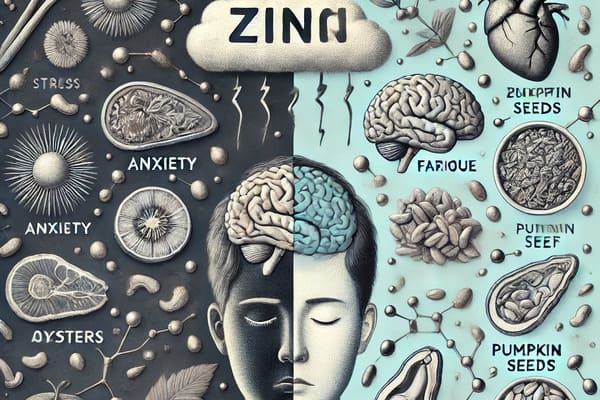If you’ve been feeling persistently low, anxious, or mentally foggy, your zinc levels might be playing a role. While depression can stem from various factors, a growing body of research shows a strong connection between zinc deficiency and mood disorders. Understanding how zinc deficiency is linked to depression could unlock new ways to improve mental well-being naturally:

The Role of Zinc in Brain Health
Zinc is an essential trace mineral that plays a vital role in neurotransmitter function, brain signaling, and immune system regulation. It influences the production of serotonin, dopamine, and other chemicals that regulate mood.
According to a 2022 study published in Frontiers in Nutrition, individuals with depression often show significantly lower zinc levels than those without mental health conditions. Researchers have found that zinc helps control the brain’s response to stress, reducing inflammation and oxidative damage linked to depressive symptoms.
The Role of Zinc in Mood Disorders
When the body lacks sufficient zinc, neurotransmitter balance is disrupted, often leading to symptoms such as irritability, fatigue, and emotional instability. Studies have highlighted that people with chronic stress or depressive disorders frequently have lower zinc concentrations in their bloodstream.
A 2023 meta-analysis published in Nutrients revealed that individuals with zinc deficiency were 1.5 times more likely to experience depressive symptoms than those with adequate zinc levels.
Zinc Deficiency Causes: Why Zinc Levels Drop
Certain lifestyle habits and health conditions can deplete zinc levels. Poor dietary choices, chronic stress, excessive alcohol consumption, and gastrointestinal disorders can impair zinc absorption. Additionally, vegetarians and vegans may be at greater risk since plant-based foods contain phytates that reduce zinc bioavailability.

Symptoms of Zinc Deficiency
Low zinc levels can manifest in various ways, including:
- Persistent fatigue
- Difficulty in concentrating
- Frequent colds or infections
- Impaired taste or smell
- Mood swings or increased anxiety
If you recognize these symptoms, consulting a healthcare provider for a zinc test can help identify deficiencies.
Top Zinc-Rich Foods for Better Mental Health
Incorporating zinc-rich foods into your diet is an effective way to restore optimal levels. Some excellent dietary sources include:
- Oysters: Among the richest sources of zinc, offering nearly 74 mg per 100g.
- Pumpkin seeds: Provide a plant-based zinc boost with around 2 mg per ounce.
- Chickpeas and lentils: These legumes are zinc-rich and versatile for various dishes.
- Cashews: A convenient snack packed with roughly 1.6 mg per ounce.
- Dark Chocolate: Dark chocolate, especially with high cocoa content, can be a source of zinc and other minerals.
Balancing these with vitamin C-rich foods can improve zinc absorption and boost overall immune function.
Supplementing with Zinc
For those struggling to meet their zinc needs through diet alone, supplements like zinc deficiency tablets may be a practical solution. Zinc gluconate, zinc sulfate, and zinc acetate are among the most bioavailable forms.
Research shows that a daily intake of 15-30 mg of zinc can improve mood and cognitive function, particularly in those with diagnosed deficiencies. However, exceeding 40 mg daily can interfere with copper absorption, so dosage should be monitored.
Combining Zinc with Other Nutrients
Zinc’s benefits are amplified when combined with complementary nutrients like magnesium, vitamin B6, and omega-3 fatty acids. Magnesium helps regulate neurotransmitter activity, while B6 enhances zinc absorption and supports mood stabilization. Omega-3s, found in fatty fish and flaxseeds, further reduce inflammation linked to depressive disorders.
A Real-Life Example of Zinc Deficiency
A recent case study published in Journal of Affective Disorders featured a 38-year-old woman named Maria (name changed for privacy) who had struggled with persistent anxiety and mood swings for over a year. Despite trying conventional treatments, her symptoms persisted. After a blood test revealed low zinc levels, her doctor recommended increasing zinc intake through food and supplements. Within 3 months, Maria reported improved mood stability, reduced anxiety, and better sleep quality.
Zinc is Critical for Mental Well-being
Addressing zinc deficiency offers a promising avenue for improving mental well-being. By incorporating zinc-rich foods, considering supplements when necessary, and maintaining a balanced diet, individuals struggling with depression may experience notable improvements. If persistent low mood continues, consulting with a healthcare provider can ensure a personalized approach to mental wellness.




